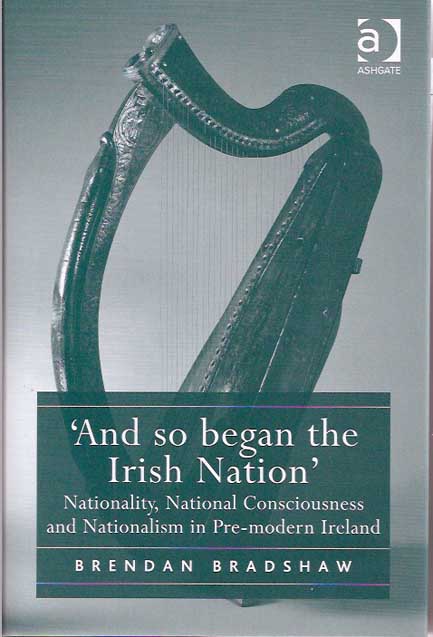BRENDAN BRADSHAW
Ashgate
£75
ISBN 9781472442567
Reviewed by Hiram Morgan

This book is a collection of essays by Brendan Bradshaw, the well-known historian of Tudor Ireland and opponent of historical revisionism. Besides a number of new pieces, it includes reprints of the various essays and reviews in which he laid down his famous challenge to the Irish historical profession.
Bradshaw is from Limerick; his father was twice Fianna Fáil mayor of the city. He became a priest in the Marist missionary order but his study of history, first at UCD and then at Cambridge, led to a distinguished academic career. Though a director of studies in history at Queens’ College and a reader at university level, he never received the advancement he deserved for his scholarship. His Dissolution of the monasteries in Ireland under Henry VIII (1974) was a brilliant first monograph, which still stands as the key work on the subject. He followed this up with a finely argued interpretation of Surrender and Regrant under the title The Irish constitutional revolution of the sixteenth century (1979). During the two following decades he contributed to and edited various works relating to the New British History. He took an instrumentalist approach to promoting this subject, which he characterised as ‘the British Problem’. He wanted to make British and English history less Anglocentric, to make Irish, Scottish and Welsh history better known, to address the singularity of Ireland’s experience by comparison, and to provide by default more opportunities for Irish Studies in Britain. Bradshaw is also an outstanding scholar of early modern intellectual history, most notably of the humanist writings of Erasmus, More and Fisher. Erasmus had been a visiting scholar at Queens’ College and one might easily consider Bradshaw as a latter-day Irish member of his circle. This is in fact the most important aspect of Bradshaw and the key to understanding his work on Ireland because he is essentially a Renaissance Christian humanist. This explains his insights not only into the commonwealth men working on the Tudors’ Irish policy and the wider national consciousness of the period but also his modus operandi in dealing with the question of historical revisionism. This is seen in the powerful erudition he displays, the sophistication of arguments he develops, and the use of repetition and even the ad hominem attack he deploys. These are the hallmarks of a master Renaissance polemicist at work and are what made him such a fearsome opponent when it came to debating Irish history.
It is for his contribution to this debate that Bradshaw will be remembered. The debate on revisionism had already been ongoing for a number of years when he launched his attack with ‘Nationalism and Historical Scholarship in Modern Ireland’ in Irish Historical Studies in 1989. Its reprint on the eve of the 100th anniversary of the 1916 Rising is timely. Bradshaw argued that the development of Irish history-writing had taken a wrong turn in the 1930s and 1940s, when its future professorate studied for their Ph.Ds in the Institute of Historical Research in London. There they had imbibed a dry empiricism, which they and their students subsequently applied to the Irish past. Its under-theorised Rankean approach was axiomatically myth-busting and tended to sever the past from the present. Even worse, it was intellectually and morally incapable of dealing with the traumatic aspects of Irish history. It lacked empathy. The Famine became an exercise in statistics, the brutality of sectarian massacre that the Reformation and Counter-Reformation had brought to Ireland was elided, and the native leaders standing up against the English juggernaut were left neutered by negative scepticism. As a result, the country faced the prospect of lacking a past that made sense, and its people of being denied the inspiration of heroic exemplars.
In the years since, a lot of what Bradshaw called for has been achieved—scholarship has presented more rounded pictures of the Famine, of Early Modern atrocities and of the leaders of native resistance, as Bradshaw does himself in this volume with a contextualised study of his boyhood hero, Patrick Sarsfield. Furthermore, Bradshaw himself remains, despite his infirmities, capable of the greatest scholarship, full of clarity, convincing argument and revisionism in the best sense of the word. While this book is a bit expensive, it is worth having for the title essay alone on the emergence of national consciousness in Ireland. In that lengthy piece he provides not only a synthesis of his earlier researches but also a penetrating overview of the development of Irish political ideas in the Early Modern period. In it he challenges the conventional view that nationalism began in the French Revolutionary period. He begins by using—somewhat ironically—the social sciences’ own definitions of nationalism, nationality and ethnicity and transporting them back to earlier times. He demonstrates that Irish nationality existed in the Middle Ages, that this was evident in the response of the bardic poets to the Tudor Conquest, and that during the sixteenth century Old English humanists such as Stanihurst and Nugent began, through emphasis on a common patria, an integrative process that saw the descendants of the Anglo-Norman conquerors being brought within the Irish nation. He caps his argument with three insightful examples: Geoffrey Keating’s formulation of a new history for this integrated Catholic nation in Foras Feasa ar Éirinn, Patrick Darcy’s constitutional case for Irish sovereignty and a study of Dáithi Ó Bruadair’s poetry, showing his work to be nationally minded rather than Jacobite. This fantastic essay should be placed on every Irish Studies reading list. Bradshaw could easily have included as a further example Hugh O’Neill’s espousal of nationalist ideas. Yet that is its beauty—it is a compelling thesis that can encompass many more examples. Furthermore, by corollary, it provides a far longer lead-in to 1916 than many would expect, let alone accept.
Hiram Morgan lectures in history at University College Cork.

